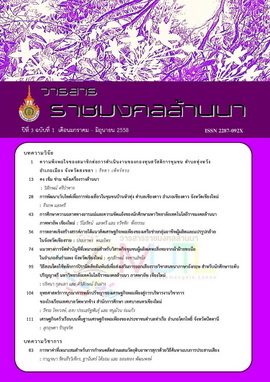การศึกษาความฉลาดทางอารมณ์และความขัดแย้งของนักศึกษา มหาวิทยาลัยเทคโนโลยีราชมงคลล้านนา ภาคพายัพ เชียงใหม่
Main Article Content
Abstract
การวิจัยครั้งนี้มีวัตถุประสงค์เพื่อศึกษาความฉลาดทางอารมณ์ และความขัดแย้งของนักศึกษา และแนวทางการแก้ไขความขัดแย้งของนักศึกษามหาวิทยาลัยเทคโนโลยีราชมงคลล้านนาภาคพายัพ เชียงใหม่ กลุ่มตัวอย่างเป็นนักศึกษาหลักสูตรต่อเนื่อง/เทียบโอน ชั้นปีที่ 1–3 คณะวิศวกรรมศาสตร์ มหาวิทยาลัยเทคโนโลยีราชมงคลล้านนาภาคพายัพ เชียงใหม่ ปีการศึกษา 2556 จำนวน 322 คน ได้มาจากการสุ่มแบบหลายขั้นตอน ส่วนผู้ให้ข้อมูลแนวทางการแก้ไขความขัดแย้งของนักศึกษา ประกอบด้วย อาจารย์ผู้รับผิดชอบและมีหน้าที่เกี่ยวข้องกับนักศึกษารวม 6 คน และผู้นำนักศึกษา รวม 2 คน เครื่องมือที่ใช้เป็นแบบทดสอบวัดความฉลาดทางอารมณ์และแบบทดสอบวัดความขัดแย้ง การวิเคราะห์ข้อมูลใช้สถิติความถี่ ร้อยละ ค่าเฉลี่ย และค่าส่วนเบี่ยงเบนมาตรฐาน ส่วนแนวทางการแก้ไขความขัดแย้งของนักศึกษาใช้การสัมภาษณ์เชิงลึก
ผลการวิจัยสรุปได้ดังนี้ นักศึกษาคณะวิศวกรรมศาสตร์ มหาวิทยาลัยเทคโนโลยีราชมงคลล้านนา ภาคพายัพ เชียงใหม่ 1) มีระดับความฉลาดทางอารมณ์อยู่ในระดับสูงทุกด้าน ( = 3.99) โดยด้านที่มีระดับความฉลาดทางอารมณ์สูงกว่าเกณฑ์ปกติมากที่สุดคือการสร้างความสัมพันธ์กับผู้อื่น ( = 4.19) 2)ใช้วิธีการแก้ปัญหาความขัดแย้งเรียงตามลำดับดังนี้ วิธีการกลมกลืน (ร้อยละ 25.42) วิธีการร่วมมือ (ร้อยละ 22.60) วิธีการประนีประนอม (ร้อยละ 22.27) วิธีการหลีกเลี่ยง (ร้อยละ 20.91) และ วิธีการแข่งขัน (ร้อยละ 8.80) แนวทางการแก้ไขปัญหาความขัดแย้งได้แก่ มหาวิทยาลัยควรมีคู่มือนักศึกษาที่ระบุบทลงโทษอย่างชัดเจน มีการจัดกิจกรรมต่างๆ เพื่อส่งเสริมทำให้รู้จักและเข้าใจนักศึกษา มีการปรับเปลี่ยนวิธีการรับน้องให้สร้างสรรค์ บทบาทอาจารย์ที่ปรึกษาและอาจารย์ผู้สอนต้องช่วยกันสอดส่องดูแลพฤติกรรมของนักศึกษาร่วมกัน และมหาวิทยาลัยควรมีการให้ขวัญกำลังใจแก่อาจารย์ผู้รับผิดชอบ และมีหน้าที่ดูแลนักศึกษาอย่างทั่วถึง
A study of Emotional Quotients and Conflict of Rajamangala University of Technology Lanna Students, Chiang-Mai Campus
This study aimed to examine Emotional quotients and conflicts of students at Rajamangala University of Technology Lanna, Chiang-Mai Campus, as well as ways to solve these conflicts. The samples were 322 students in the 1st-3rd year in continuing or credit transfer program of Engineering Faculty in academic year 2014. The samples were selected by multi-stage sampling technique. Evaluators of conflict management in this study were 6 lecturers and 2 student leaders. Instruments used were Emotional quotients test and Conflict management test. Data were analyzed with descriptive statistics for frequency, percentile, mean, and standard deviation. Solutions of students’ conflict were analyzed from in-depth interview. Results showed that Engineering students of Rajamangala University of Technology Lanna, Chiang-Mai Campus 1) had high level of Emotional quotients in all aspects (X=3.99) with the highest score in association with others (X=4.19); and 2) solved conflicts problems with harmony (25.42%), collaboration (22.60%), compromisation (22.27%), avoidance (20.91%), and competition (8.80%), respectively.
The guidelines for conflict managements were: provision of students’ manuals that clearly identify the penalty provision, adjustment of First-year Welcoming Ceremony to more creative, requirement for more attention in students from advisors and lecturers, rewards provided by the university to staff who provides great students’ supervision.
Article Details
บทความวิจัยนี้เป็นของลิขสิทธิ์

